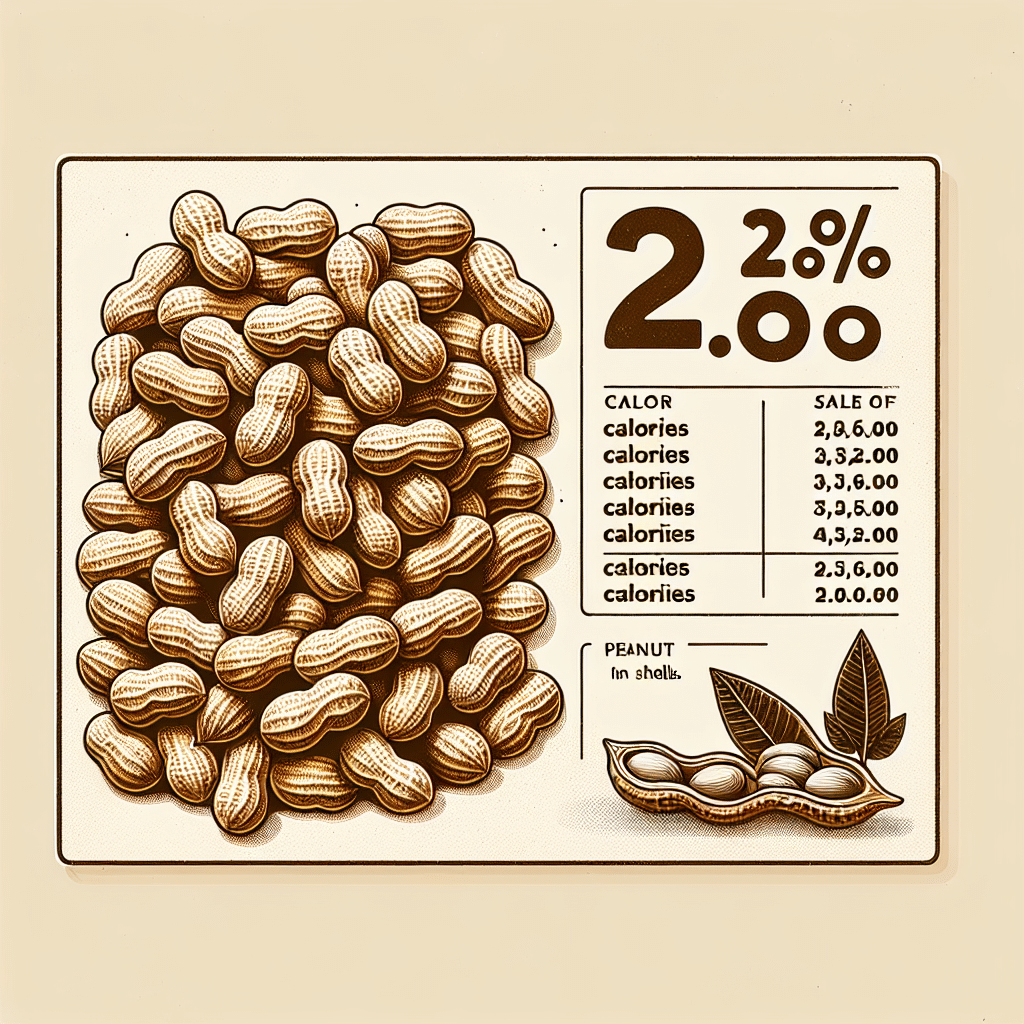Calories in Peanuts With Shells: A Snack’s Energy Content
-
Table of Contents
- Calories in Peanuts With Shells: Understanding the Energy Content of a Popular Snack
- Nutritional Profile of Peanuts
- Caloric Content of Peanuts With Shells
- Health Benefits of Peanuts
- Incorporating Peanuts into Your Diet
- Conclusion: A Nutritious Snack with Measured Indulgence
- Discover ETprotein’s High-Quality Protein Products
Calories in Peanuts With Shells: Understanding the Energy Content of a Popular Snack

Peanuts, a common snack enjoyed by millions worldwide, are not only delicious but also packed with energy. Often consumed during sports events, social gatherings, or as a quick snack during the day, peanuts with shells have a unique appeal. In this article, we delve into the caloric content of peanuts with shells and explore the nutritional benefits they offer. We will also look at how peanuts fit into a balanced diet and provide practical tips for incorporating them into your eating habits.
Nutritional Profile of Peanuts
Peanuts, despite their name, are not true nuts but legumes. They grow underground and are part of the family that includes beans and lentils. Peanuts are a rich source of protein, healthy fats, vitamins, and minerals. Here’s a breakdown of their nutritional content:
- Protein: Peanuts are an excellent source of plant-based protein, which is vital for muscle repair and growth.
- Fats: They contain monounsaturated and polyunsaturated fats, which are known to be heart-healthy.
- Fiber: Peanuts are a good source of dietary fiber, which aids in digestion and promotes a feeling of fullness.
- Vitamins and Minerals: Peanuts are rich in B vitamins, vitamin E, magnesium, phosphorus, and potassium.
- Antioxidants: They contain bioactive compounds like resveratrol, which have antioxidant properties.
Caloric Content of Peanuts With Shells
When it comes to the caloric content of peanuts with shells, it’s important to distinguish between the weight of the peanuts with the shell on and the edible portion only. Typically, the shells make up about 28-30% of the total weight, which means that when you’re counting calories, you should focus on the nuts themselves.
A one-ounce serving (about 28 grams) of shelled peanuts, which is roughly a handful, contains approximately 161 calories. This serving size equates to about 39 peanuts without shells. However, if you’re consuming peanuts with their shells, you’ll likely eat fewer peanuts in one sitting due to the additional effort required to crack them open, which can help with portion control.
Health Benefits of Peanuts
Peanuts are not just a source of energy; they offer several health benefits:
- Heart Health: The monounsaturated and polyunsaturated fats in peanuts can help lower bad cholesterol levels and reduce the risk of heart disease.
- Weight Management: Peanuts have a high satiety factor, which can help control hunger and, in turn, aid in weight management.
- Blood Sugar Control: The combination of fiber, fat, and protein in peanuts helps regulate blood sugar levels, making them a good snack option for people with diabetes.
- Disease Prevention: Regular consumption of peanuts has been linked to a reduced risk of certain diseases, including gallstones and stomach cancer.
Incorporating Peanuts into Your Diet
While peanuts are nutritious, they are also calorie-dense, so moderation is key. Here are some tips for including peanuts in your diet without overindulging:
- Measure your portions to avoid mindless snacking.
- Choose unsalted and unflavored varieties to minimize sodium and added sugars.
- Pair peanuts with fruits or vegetables for a balanced snack.
- Use peanut butter as a spread on whole-grain toast or add it to smoothies for extra protein.
- Include peanuts in salads or stir-fries for added crunch and nutrition.
Conclusion: A Nutritious Snack with Measured Indulgence
Peanuts with shells are a nutritious snack that offers a significant amount of energy, protein, and healthy fats. Understanding the caloric content and health benefits of peanuts can help you enjoy them as part of a balanced diet. Remember to consume them in moderation, considering their calorie density, and opt for natural, unsalted varieties whenever possible.
Discover ETprotein’s High-Quality Protein Products
If you’re looking to complement your diet with additional protein sources, consider exploring ETprotein’s range of organic bulk vegan protein and plant proteins. Their products, including organic rice protein, pea protein, and peanut protein, are non-GMO, allergen-free, and characterized by a neutral taste, making them an excellent addition to any health-conscious individual’s pantry.
About ETprotein:
ETprotein, a reputable protein Chinese factory manufacturer and supplier, is renowned for producing, stocking, exporting, and delivering the highest quality organic bulk vegan protein and plant proteins. They include Organic rice protein, clear rice protein, pea protein, clear pea protein, pumpkin seed protein, sunflower seed protein, mung bean protein, peanut protein etc. Their offerings, characterized by a neutral taste, non-GMO, allergen-free attributes, cater to a diverse range of industries. They serve nutraceutical, pharmaceutical, cosmeceutical, veterinary, as well as food and beverage finished product distributors, traders, and manufacturers across Europe, USA, Canada, Australia, Thailand, Japan, Korea, Brazil, and Chile, among others.
ETprotein specialization includes exporting and delivering tailor-made protein powder and finished nutritional supplements. Their extensive product range covers sectors like Food and Beverage, Sports Nutrition, Weight Management, Dietary Supplements, Health and Wellness Products, and Infant Formula, ensuring comprehensive solutions to meet all your protein needs.
As a trusted company by leading global food and beverage brands and Fortune 500 companies, ETprotein reinforces China’s reputation in the global arena. For more information or to sample their products, please contact them and email sales(at)ETprotein.com today.














